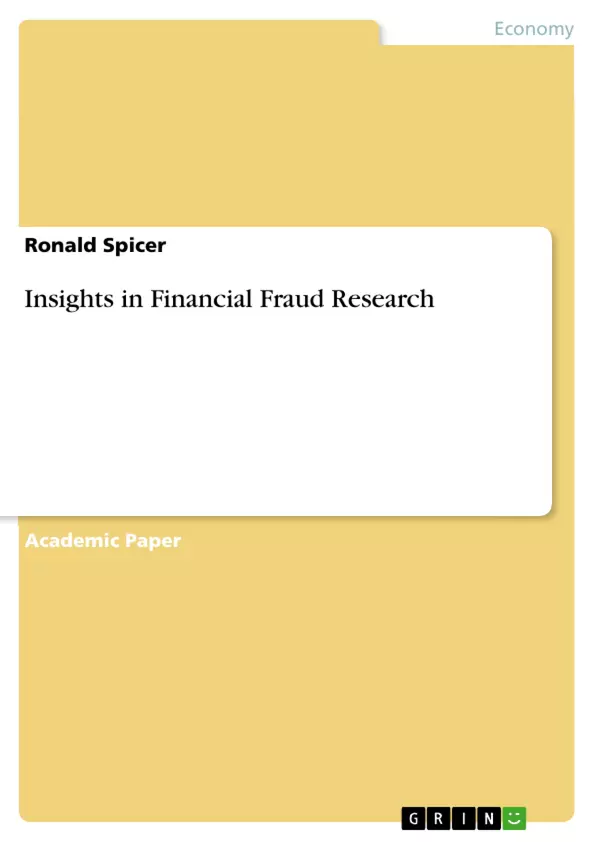This work is a review of financial fraud research and the trends this type of research is currently taking. It will present an examination of the state of research in this field.
Attention will also be paid to the practical applications of financial fraud research. In addition, there is a review of theory in financial fraud research and the role of ethics in this research field. Suggestions for the future direction of financial fraud research will be given.
This work includes a final chapter with selected fraud case studies from the archives of the Federal Bureau of Investigation (FBI), the Internal Revenue Service (IRS), and the Security and Exchange Commission.
Inhaltsverzeichnis (Table of Contents)
- Overview of Financial Fraud Research
- Research in Financial Fraud
- Practical Applications of Financial Fraud Research
- The Theories Underlying Financial Fraud Research
- Ethics in financial fraud research
- Future directions
- Addendum: Selected Fraud Cases
Zielsetzung und Themenschwerpunkte (Objectives and Key Themes)
This book aims to provide a comprehensive review of financial fraud research, exploring its trends, practical applications, underlying theories, ethical considerations, and future directions. It also delves into selected fraud case studies from the FBI, IRS, and SEC archives.
- The evolution of financial fraud research from quantitative to qualitative methods
- The significance of the Fraud Triangle Theory and its limitations
- Factors influencing the commission of financial fraud, including organizational circumstances, personal characteristics, and infrastructure issues
- The impact of financial fraud on businesses and stakeholders
- The need for further research to understand the dynamics of financial fraud and its consequences
Zusammenfassung der Kapitel (Chapter Summaries)
- Overview of Financial Fraud Research: This chapter examines the financial fraud epidemic, its growth over the past 15-20 years, and the need for a more integrated approach to research that combines theory with practical application.
- Research in Financial Fraud: This chapter summarizes the existing research on financial fraud, including the seminal work of Donald Cressey and his Fraud Triangle Theory. It also explores the various factors that can influence the commission of fraud, such as psychological factors, infrastructure issues, and the complexity of rationalization.
- Practical Applications of Financial Fraud Research: This chapter focuses on the real-world applications of financial fraud research, emphasizing its importance for businesses and stakeholders. It examines the cost of fraud to businesses and highlights the need for more effective detection and deterrence strategies.
- The Theories Underlying Financial Fraud Research: This chapter delves into the theoretical frameworks that underpin financial fraud research, discussing the strengths and limitations of existing theories and suggesting avenues for future theoretical development.
- Ethics in Financial Fraud Research: This chapter examines the ethical considerations involved in financial fraud research, addressing issues such as data privacy, confidentiality, and the responsible use of research findings.
Schlüsselwörter (Keywords)
Financial fraud, research, Fraud Triangle Theory, organizational circumstances, personal characteristics, infrastructure issues, ethical considerations, case studies, FBI, IRS, SEC.
- Arbeit zitieren
- Ronald Spicer (Autor:in), 2015, Insights in Financial Fraud Research, München, GRIN Verlag, https://www.grin.com/document/451206




